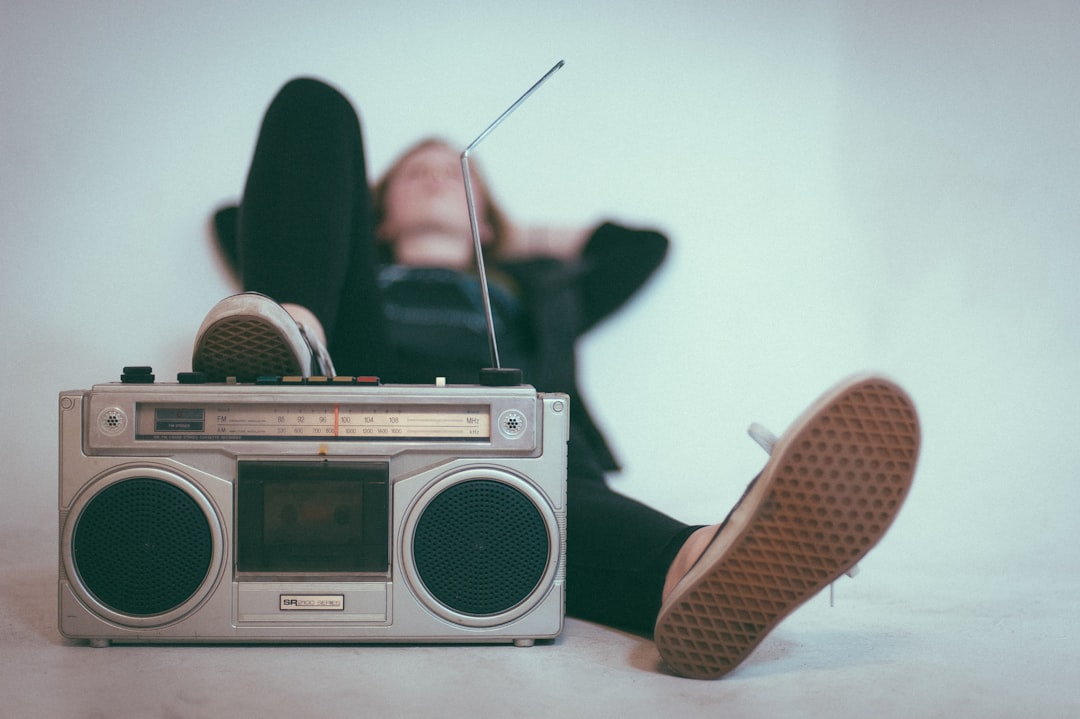Our brains on music
It has the power to heal. To energise and inspire. It can connect and transport us. Yet we often take this natural high for granted. But what happens when we stop to really listen?
Music has been on my mind lately. Maybe it’s because I’ve been engrossed in Daisy Jones & The Six. Or perhaps it's because I fell down a(nother) fascinating rabbit hole. I'll let you decide.
We often take it for granted. But it is such a powerful thing. It can transport us through time and across place, hurt and heal us, energise or soothe our often overloaded brains. It can connect us, inspire us, send us spiralling.

I've been thinking about music a lot.
Maybe it’s because… a certain TV adaptation has got me wondering about the way songs are written. And it’s taken me on a memory train to a childhood listening to Fleetwood Mac on the school run. In a converted hearse.
Or perhaps it’s because… The Smashing Pumpkins randomly started playing on Spotify. And my husband thought it was me because we share an account. When, clearly, our house is haunted by a ghost with exceptional taste.
And also… when we played Today in the car on the way home from CrossFit on Friday, it felt like my brain was being tickled by the tune. As the song progressed through builds and bridges, I could feel the beats lighting up my synapses and travelling towards the grey matter (I have no idea if that was what was actually happening, but that was my best non-neuroscientist guess). Each crescendo was like a wave of massage.

A similar thing happened the first time I listened to an 8D track. I’d read that neurodivergent people tend to have a strong sensory experience with it, and I was curious as to whether I would. It’s probably no surprise to hear that I did. Next, while listening to an 8D song, I found myself laughing out loud at times and really struggling to stay still. I then got a couple of folks to try it. One had a similar experience. The other was unmoved. All three of us are neurodivergent. Interestingly, the person who didn’t have a visceral reaction is the only one of us to come from a musical background. He wasn’t keen on this particular song, and it would make sense to me that this is likely to be a subjective experience.
In far more rigorous scientific experiments than my moment of play, researchers have been using MRI technology to explore how our brains process music. From studying the brains of jazz musicians and comparing the wiring of non musicians to musicians, to exploring how different genres of music are experienced, the results are as fascinating as they are complex.
It can be a lot to wrap your head around. But luckily for me (and therefore for you!), I came across an article by The Kennedy Centre, which succinctly describes the way that playing or listening to music gives large areas of our brains a workout…
“Researchers have discovered that the brain does not have one special place to analyze music. Instead, different parts of the brain handle different aspects of a song, like rhythm (the beat) and tone (pitch and loudness). And one of the most mind-blowing discoveries is that the parts of the brain that deal with emotions also fire up in response to music. In other words, music is wired directly into our feelings.”
It’s pretty amazing stuff, isn’t it? And it feels very aligned with what was happening in my brain on that rainy drive home last week.
Another exciting area of research is the potential of music to reactivate damaged areas of, or possibly even rewire, our brains. Neonatologists are exploring Creative Music Therapy as a means to mitigate neurodevelopmental impairments in very premature babies. And music therapy has shown promising results in people experiencing Parkinson’s, dementia, strokes, depression and more.
My granny, who lived until 99, suffered from dementia. Long after she’d forgotten who I was and had begun misplacing her children’s names, she could still remember every word of songs from decades ago. I cherish the video of her singing Perry Como’s Catch A Falling Star with my then five year-old, her great-granddaughter. Granny giggled at the end when she was the only one to keep going.

Music can also help us to get in the zone and perform at our best. Reading about US snowboarder Hannah Teter’s preference for techno while competing in the 2006 Olympics, where she won a gold in the half pipe, reminded me that my tune of choice in the winter of 2005 was Jill Scott’s It’s Love. I’m no Olympian, but for me this was the perfect song to cruise down the slopes to, while experiencing flow and (hopefully!) avoid catching an edge. For park days I needed something different. Body Movin’ by The Beastie Boys usually did the trick. And, sometimes, I did too.
Every time I listen to these songs now I’m taken straight back to British Columbia. To a liminal time, where I didn’t know where I was going but I finally felt free to pick up the fractured pieces and start forging the me that would move forwards from here.
Speaking of time travel, there are entire albums that I can no longer listen to. They take me back to a time I have no desire to revisit. To harsh words like lemon juice, forever leaking into tiny cuts. The feel of hot metal against my back. To shoves and grabs and twists. These songs take me to a place I was stuck in for too long. And just as music has the power to uplift and soothe and inspire us, so too it can transport us to unsafe places.

Music-evoked autobiographical memory - to give it its official name - often happens without warning. There’s a certain 90s dance track that I can’t hear without being transported back in time to the North East of Scotland. My hands clutching the back of the polished pew as my brain scrambles to reconcile the wooden box at the front of the church with the days fresh memory of my friend gently tucking a blanket around me as I fell asleep on his sofa.
Listening to music can be bitterly painful. And it can also be transcendental. To feel something so deeply is surely what it means to have lived. And to have loved.
And then there’s the experience of live music. One of the most memorable gig moments for me was being up front at T In The Park in 2011 and feeling the bass reverberate through me as the Foo Fighters stood soaking up the sound of tens of thousands of voices floating across the balmy (it was Scotland so absolutely wasn’t, sweaty is more accurate) night air. Head straight to 4:30 minutes in for a moment of rock-related awe and wonder.
Another time I was walking through the Rijksmuseum underpass in Amsterdam, when the sound of a cello came wafting through. It was incredible. And completely unexpected.
Right now I’m listening to Hans Zimmer, and skipping past any piece that feels too familiar for fear that I’ll fall down a Top Gun or Gladiator-related rabbit hole next. Listening to the Interstellar soundtrack helps my mind to wander and also to wonder. I haven’t seen the film, so there aren’t the same associations to distract me.

I booked a last minute trip to Reykjavik last summer (a story for another time!) to attend the 10th European Conference on Positive Psychology. While I was there, I took part in a workshop on using art and creativity in positive psychology coaching, led by Andrea Giraldez-Hayes who - as well as being a highly regarded coaching psychologist and programme director at University of East London - is also a musician by background. In the workshop, we experimented with mark-making while listening to a piece of music. Afterwards, it was fascinating to hear the journey that it took people on, in just a few short minutes. We were a group of coaches and therapists, and together discussed how this reflective practice could be used as a reset in between sessions. An emotional palate cleanser of sorts.
Music can also be used as meditation. I recently took part in a gaming-themed ADHD workshop run by Flown Space. ADHDers often struggle to meditate in the traditional sense, but by combining movement and mark-making (without looking), many of the participants described being able to access a meditative state and feeling calmer afterwards. For me, the exercise felt uplifting and energising, rather than calming. I wasn’t wearing wireless headphones so stayed sitting, and the combination of automatic drawing and the background music being played felt like it was sparking my creative fires.

Want to play? If all this talk about music has got you in the mood for a little experiment of your own, here’s something you could try…
Pop in earphones. Sit or lie down and close your eyes if it feels safe to do so, and play this. I’d love to hear what, if anything, happens for you in the comments.
Other things I’m curious to know, if you care to share…
What’s been your standout live music moment?
And which song transports you every time.


